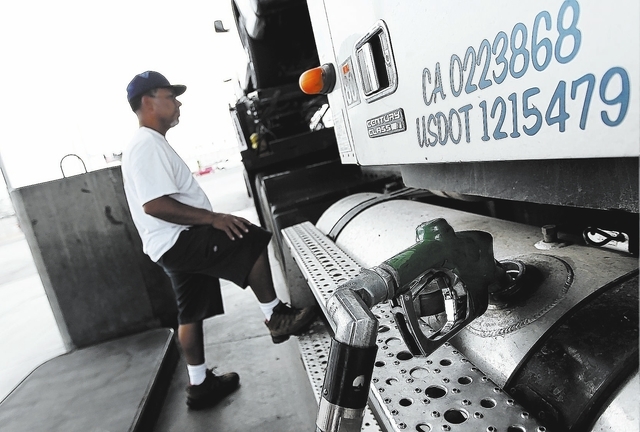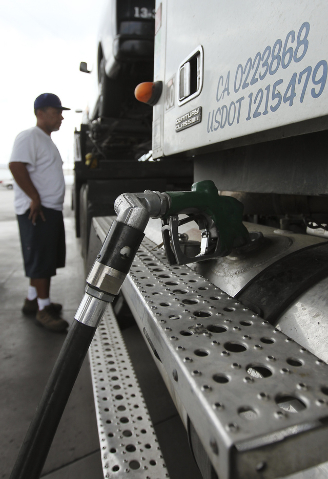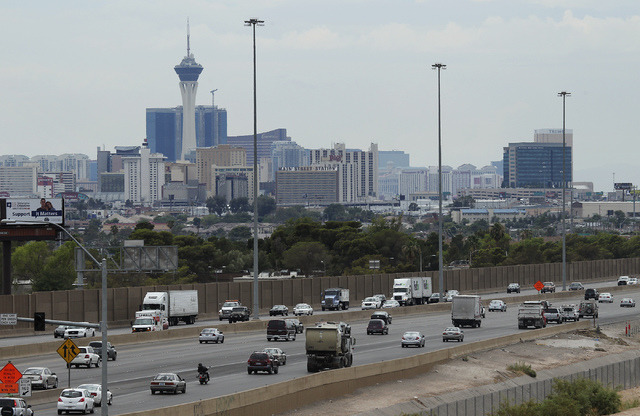Fuel tax proposal revs up support from long-haul truckers
Clark County’s fuel tax proposal has attracted an unusual ally: the long-haul trucking industry.
Even though it means paying more at the pump, the industry is lining up with labor unions in support of the proposal which comes before county commissioners today.
The reason: Legislative planning avoids the conundrum that came when a similar fuel tax for roads started in Washoe County in 2009.
After lobbying in Carson City and meeting with local officials, it comes to this: If Clark County’s proposed fuel tax measure passes, Nevada’s interstate truckers don’t have to worry about being taxed twice if they fill their rigs up in the valley and end up using the diesel outside the state.
To grasp the complexity of the situation, remember: Regional Transportation Commission officials spent days analyzing fuel tax information and how truckers pay fuel taxes and track their miles while moving freight across the state borders. The tradeoff, if there is one, is that the trucking industry backs the county’s fuel tax proposal, which commissioners will likely vote on today.Besides public comments, the issue is bound to bring spirited conversation among commissioners as they debate the economic benefits of improved highways versus the impact of higher gas prices with a soft economy.
The county proposal, which ties fuel tax increases to the rate of inflation, would increase the tax on each gallon by about 10 cents in the next three years to generate money for road and highway improvements.
One challenge: figuring out to avoid short-changing truckers who travel across Nevada borders after fueling up in Clark County. The state law passed this year, if adopted by the county, would keep long-haul truckers from being forced to pay twice for fuel taxes when they venture across the Nevada border.
“In the end, I think we felt it was fair,” said Tina Quigley, general manager of the Regional Transportation Commission.
That type of fuel tax increase isn’t new to Nevada. Washoe County started its fuel tax in 2009, increasing the overall tax by roughly 3 cents a gallon every year since despite strong opposition from its trucking industry. That county’s fuel tax is now about 13.5 cents a gallon.
In the long-haul trucking world, where drivers cross multiple states on a tank of diesel, they abide by a compact called the International Fuel Tax Agreement.
Under that agreement, truckers log their miles traveled in each state and Canadian province and file reports in their home state. Under the system, each state that a truck travels in gets fuel tax revenues, based on that individual state’s tax rate and the miles traveled in that jurisdiction. So if truckers end up owing more fuel tax, it’s sent in. If they are due a refund, they get one.
Here’s the hitch: the agreement doesn’t factor in county fuel taxes, only state-level fuel taxes. So a trucker fueling in Washoe County and heading to California ends up paying 13.5 cents in county fuel taxes. That 13.5 cents comes into play because it brings the state and county diesel tax rate to 39.5 cents a gallon. In California, the tax per gallon is 44.5 cents.
But instead of making up only a 4-cent difference per gallon, truckers driving in California have to pay a 17.5-cent difference for each gallon, according to the Nevada Trucking Association.
As a result, the Washoe County-based trucking companies were put at a competitive disadvantage with California-based haulers that fuel up outside the county, said Paul Enos, chief executive officer of the Nevada Trucking Association. Enos calls it “double taxation.”
The Nevada trucking industry struck an agreement when state lawmakers crafted the legislation that allows Clark County’s vote on the fuel tax. Under the legislation, truckers would get credit for the county fuel tax they pay when they travel out of the state. Truckers won’t get a rebate on the county gas tax for miles traveled in Nevada outside of Clark County.
“We do think that all in all, this was a pretty good compromise to fund our roads,” Enos said.
Enos said the tax is preferred over other options like toll roads and would make a good investment into the region’s transportation needs.
The Nevada Trucking Association estimates that refunding trucking companies in the first year would be about $540,000 in county fuel taxes, based on a 3-cent per gallon increase.
The county’s existing fuel tax is 9 cents. Each gallon has 52.2 cents of taxes and fees, including federal, state and county taxes.
If the measure passes, voters in 2016 will get to weigh in on whether they want future fuel tax increases that are tied to inflation.
Contact reporter Ben Botkin at bbotkin@reviewjournal.com or 702-405-9781. Follow him on Twitter @BenBotkin1.






























